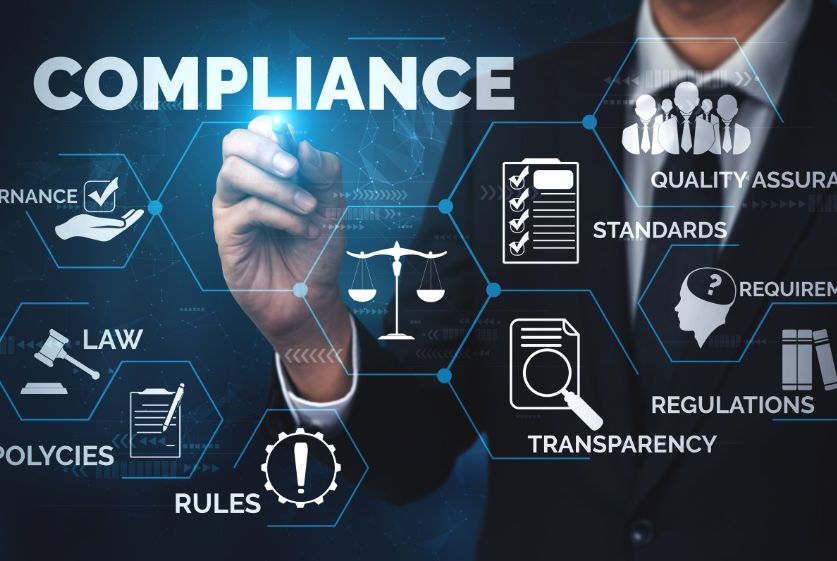A Compliance Analyst Cybersecurity is a professional who helps organizations assess, audit, and report on their compliance with cybersecurity regulations and policies.
Their primary role is to ensure that companies have the proper controls and processes in place to protect sensitive data, guard against threats, and meet legal and industry requirements related to information security. Compliance analysts serve as the connective tissue between an organization’s cybersecurity program and its legal/regulatory obligations.
They analyze risk, work to align security strategies with compliance standards, and advise leadership on how to avoid penalties and mitigate liabilities. Their oversight provides the assurance that security policies and systems are operating as intended.
Table of Contents
Responsibilities of a Compliance Analyst Cybersecurity
The day-to-day work of a compliance analyst involves the following types of activities:
Assessing Cybersecurity Risks
Compliance analysts conduct in-depth assessments to identify potential security vulnerabilities, gaps in controls and protections, and areas of regulatory non-compliance.
This includes things like data privacy risks, endpoint security weaknesses, cloud security oversights, etc. They’ll probe deeply into systems, policies, and procedures across the company.

Evaluating Security Controls
Based on risk assessments, compliance analysts measure how existing security controls stack up against regulations and industry best practices. This helps determine where enhanced controls and processes are needed to improve cyber defenses and avoid non-compliance.
Auditing Processes and Policies
Routine auditing makes up much of the compliance analysts’ workload. They’ll methodically inspect and verify that InfoSec protocols are being properly implemented across departments.
This includes things like access controls, data encryption, security training completion, password policies, and backup procedures, among others.
Reporting and Documentation
Compliance analysts present audit findings and make recommendations for corrective actions through detailed reports to executives and technology leaders. They also document all cybersecurity policies, controls, and processes in a central system.
Strong writing skills are a must for this aspect of the job.
Skills and Qualifications
To succeed as a compliance analyst in cybersecurity, there are several important knowledge, skills and abilities (KSAs) required:
Knowledge of Regulations
An understanding of laws like HIPAA, PCI DSS, SOX, GLBA, NIST frameworks, and other global/industry-specific regulations is essential. Analysts must interpret and translate these regulatory demands into actionable measures.

Attention to Detail
Keen attention to detail is crucial when conducting risk analyses, audits, and evaluations of security controls. Compliance analysts cannot afford to miss red flags, gaps, inconsistencies, or other subtle indicators of non-compliance.
Communication Skills
Written and verbal communication abilities are vital. Compliance analysts must convey detailed technical audit results, risk assessments, and policy recommendations clearly to executives and technology professionals.
Public speaking is also important.
Analytical Abilities
Strong analytical thinking allows compliance analysts to systematically evaluate complex cybersecurity programs against regulatory checklists, pinpoint where issues or gaps may exist, and determine appropriate next steps.
Career Path and Salary Outlook
Entry-Level Positions
Many begin as information security or cybersecurity analysts before specializing in compliance. Some companies hire compliance analysts straight out of college if they have a Bachelor’s degree in information security, computer science, or a related field.

Advancement Opportunities
With several years experience, compliance analysts may be promoted to senior analyst, compliance manager, or IT auditor roles with added responsibilities and higher pay. Obtaining certifications also boosts opportunities.
Salary and Job Growth
According to the U.S. Bureau of Labor Statistics, the average salary for compliance analysts is $97,000. Demand for these positions is projected to grow by 31% through 2030, much faster than other IT jobs.
How a Compliance Analyst Helps Strengthen Cybersecurity
By ensuring adherence to regulations and evaluating the effectiveness of security controls, compliance analysts provide several invaluable contributions:
Ensuring Security Controls Are Effective
Compliance analysts objectively verify that existing cyber defenses are fully functional and operating as intended. This identifies when and where improvements might be needed.
Identifying Gaps and Weaknesses
Through meticulous auditing and testing, compliance analysts detect security gaps, flaws in processes, and weak spots that could allow data breaches or non-compliance. This enables the organization to proactively remedy issues.
Maintaining Regulatory Compliance
Organizations rely heavily on compliance analysts to guarantee all policies, training, controls, and procedures satisfy legal/regulatory demands at all times. This prevents fines, lawsuits, and reputational damage.
Building a Culture of Security
The presence of compliance analysts motivates employees to adhere to information security best practices. Their audits and assessments promote a culture of vigilance around cyber risks and regulatory obligations.
Conclusion
Compliance analysts are integral yet often unsung heroes on any organization’s cybersecurity team. Their expert knowledge of InfoSec regulations and audit processes provides vital assurance that defense systems are robust and policies are enforced.
Companies invest wisely when hiring dedicated compliance analysts to strengthen cyber resilience. With lucrative salaries and abundant job opportunities, compliance analysis is a career path ripe with possibilities for technology professionals seeking to secure our digital landscape.
FAQs
Q: What certifications are useful for a compliance analyst?
A: Helpful certifications include CISA (Certified Information Systems Auditor), CISSP (Certified Information Systems Security Professional), and CCSP (Certified Cloud Security Professional).
Q: What soft skills are most important for a compliance analyst?
A: Strong communication, analytical thinking, attention to detail, and organization are crucial soft skills for success as a compliance analyst.
Q: What industries employ the most compliance analysts?
A: Heavily regulated sectors like finance, healthcare, insurance, and retail have great demand for compliance analysts. Government agencies also hire many.
Q: Do compliance analysts need programming or technical skills?
A: In-depth technical skills aren’t mandatory, but some scripting/programming knowledge helps analysts understand and evaluate IT systems and processes.
Q: How can experienced compliance analysts progress their careers?
A: Advancement paths include IT audit manager, chief compliance officer, risk management director, regulatory affairs manager, and cybersecurity executive roles.









